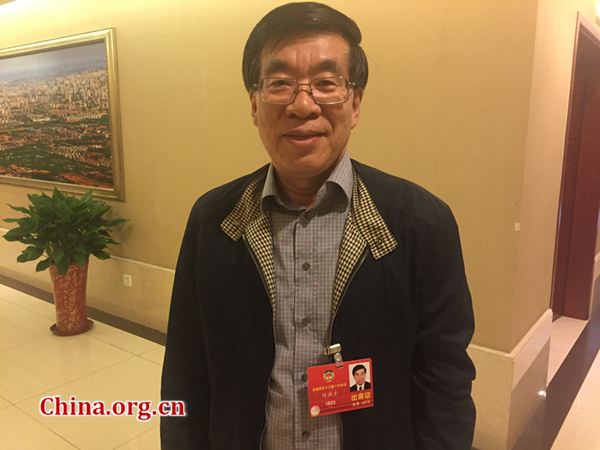Talks can solve Korean Peninsula issue: CPPCC members
- By Zhang Rui
 0 Comment(s)
0 Comment(s) Print
Print E-mail China.org.cn, March 7, 2018
E-mail China.org.cn, March 7, 2018

China's top political advisors praised the progress made on the Korean Peninsula in recent weeks and said the complicated issue could only be solved by candid negotiation and exchange among all relevant parties.
"Although there are still many uncertainties, everything is moving in a positive direction," Kong Xuanyou, vice minister of foreign affairs and special representative of the Chinese government on Korean Peninsular affairs, told China.org.cn on Tuesday. He is also a member of the 13th National Committee of the Chinese People's Political Consultative Conference (CPPCC) and is attending the ongoing first session of the 13th CPPCC National Committee which runs from March 3 to 15.
Kong said China will continue playing its part and is still firmly pushing the reopening of the six-party talks. "While we face many difficulties and problems, our fundamental position will not change, because we believe that the peninsula issue can only be solved by reaching out to one another. And the six-party talks are the best platform."

Liu Hongcai, another CPPCC member, agreed. He is the former deputy head of the International Liaison Department of the Communist Party of China and a former Chinese ambassador to the Democratic People's Republic of Korea (DPRK).
"We need joint efforts from every related party to resolve the nuclear issue and peninsula peace and development issues, and so we also need more mutual and multilateral talks," Liu said to China.org.cn.
The former ambassador admitted the situation is constantly changing, but he said he hoped the relevant parties could all work hard and would not damage each others' efforts. "We could raise and solve problems during the progress of negotiation," Liu said. "No problem can be solved without communication and talks, and only talks can enhance mutual understanding."
The Korean Peninsula situation came to the brink of war over the last year when the DPRK and the United States exchanged rhetoric and engaged in missile tests and military drills.
But after top DPRK leader Kim Jong Un expressed willingness in his New Year's speech earlier this year to participate in the South Korean-hosted 23rd Winter Olympics, the DPRK sent athletes, cheerleaders and high-ranking delegations to the sporting event in Pyeongchang. Amid the mood of emerging dialogue, South Korean President Moon Jae-in and U.S. President Donald Trump agreed to delay the annual South Korea-U.S. joint military drills scheduled during the event.
Chung Eui-yong, the top national security adviser for President Moon, led a 10-member South Korean special delegation and visited Pyongyang in a two-day visit. He also met Kim Jong Un on Monday night.
Chung held a press briefing in the South's presidential Blue House yesterday, saying that the North has shown willingness to talk "candidly" with the U.S. about denuclearization and normalized ties between Pyongyang and Washington. Kim Jong Un has also agreed to refrain from conducting nuclear and missile tests when engaging in dialogue with South Korea.
Chung is set to travel to the U.S., China, Russia and Japan to share the outcome of his talks with the DPRK leader.
The South and North also agreed to hold the third inter-Korean summit talks in late April, and further agreed to set up a hotline between the countries' leaders to closely coordinate and ease military tensions. The first talks through the hotline will be held before the late April summit.
"Any progress that would benefit the peninsula peace, benefit the reconciliation between the DPRK and South Korea and benefit the eventual achievement of denuclearization should have our support and encouragement," CPPCC member Liu said.
Liu also noted that China has been attempting to ease tensions on the Korean Peninsula and establish a platform for talks. "The Korean issue cannot be resolved without China," he added.





